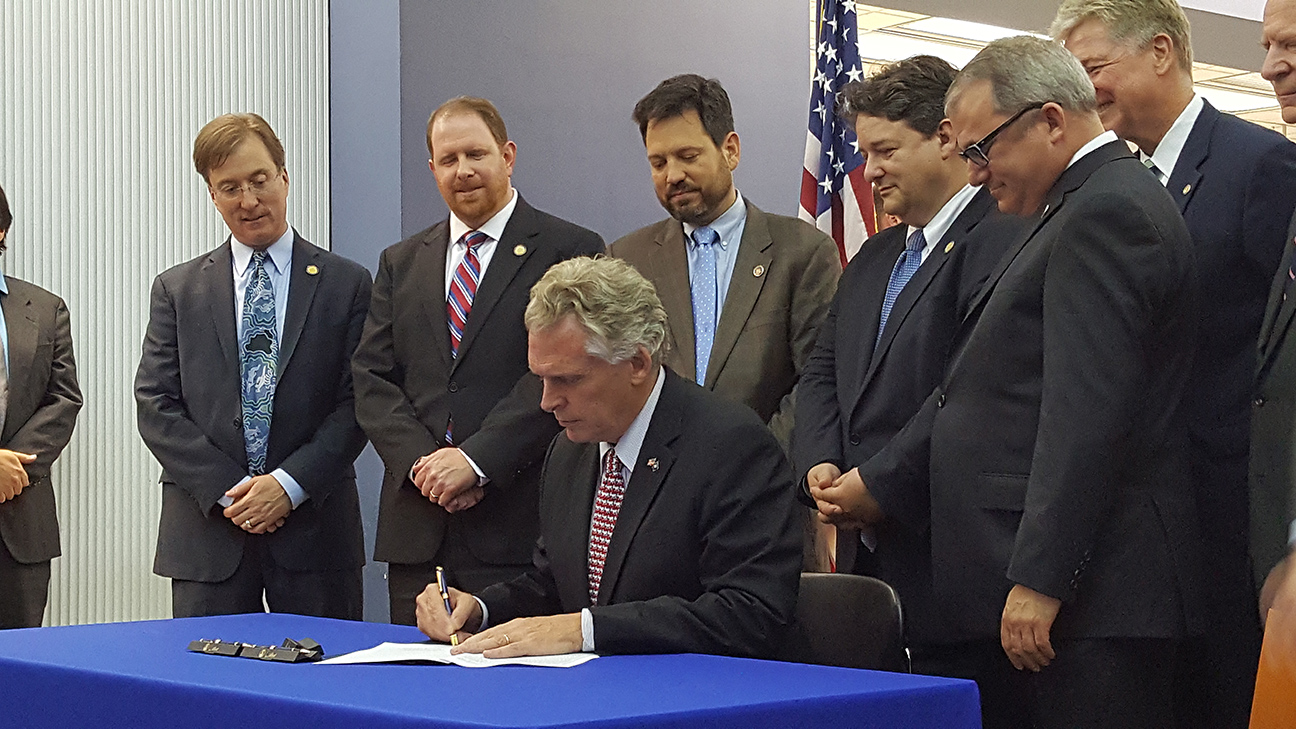
Gov. McAuliffe signs bill on driver’s license suspensions
Photo by Neill Caldwell, VICPP
By Travis Fain, The Daily Press
Driver’s licenses suspended over outstanding court fines, something that affects more than 600,000 Virginians, should be easier to reinstate now that new laws are taking effect.
Gov. Terry McAuliffe and a cadre of state legislators descended upon the state’s Department of Motor Vehicles headquarters Thursday to call attention to the changes, which advocates have pushed for some time.
It’s hard to keep a job without a driver’s license, and hard to pay court fines without a job.
“The whole idea was just bizarre to me,” McAuliffe said during a ceremonial bill signing.
The legislature passed half a dozen bills in this area during the 2017 session. The most significant are likely House Bill 2386 and its identical companion, Senate Bill 854.
They’re meant to bring payment plans into easier reach for poor people who owe court fines, partly by mandating a 10 percent cap on down payments. Virginia’s courts used a hodgepodge of payment plans in the past, with some down payments hitting 50 percent.
Those who lost their licenses said their fines started small, but when they didn’t pay, either because they couldn’t or they just didn’t, new fines began to mount. Some have gone to jail for repeatedly driving on a suspended license, with their fines mounting to five figures over the years.
“That was one of our biggest challenges in re-entry,” said Martha Rollins, who founded the Richmond charity Boaz & Ruth. “It was just so crazy.”
Drive to Work, a group headed by Rollins’ husband, Randy Rollins, plans a public awareness campaign. People who’ve had difficulty getting courts to approve payment plans they could afford in the past should reach back out to the clerks where they owe fines.
Some advocates had pushed for more changes, but attorneys who represent indigent clients said Thursday that the changes approved by nearly unanimous, bipartisan, votes in Richmond will make a major difference.
No mention was made during McAuliffe’s press conference of the federal lawsuit that once targeted this law. The Legal Aid Justice Center argued that Virginia’s law was unconstitutional because licenses were suspended regardless of whether the driver could afford to pay fines or not.
The U.S. Department of Justice agreed, filing a brief in the case. That case has since been dismissed on a technicality over venue.
McAuliffe also called attention Thursday to a bill that gives judges more latitude not to suspend drivers licenses over marijuana charges, giving courts the option of requiring an extra 50 hours of community service instead. Another bill adds job interviews to the list of reasons a judge can allow a defendant to drive on a restricted license.
Claire Gastañaga, who lobbies in Richmond for the American Civil Liberties Union, called the bills “a wonderful step forward.” She also said the philosophical change among state leaders on these issues is also important.
The payment plan bills were carried by Republicans, Del. Manoli Loupassi of Richmond and state Sen. Bill Stanley of Moneta. Other GOP members were involved in negotiations over the details.
“I really like the shift in mindset,” Gastañaga said.
Fain can be reached by phone at 757-525-1759.
